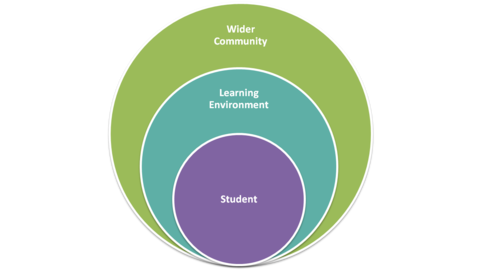Social Constructivism Assessment/Recommendations and Relevance
Recommendations for Educators
It is our intention that readers of this wiki will have understood a) what Social Constructivist theory is, b) how this theory has been applied to assessment in different learning contexts and c) where contention arises within the theory.
It is essential at this point to reiterate that Social Constructivism is one learning theory. Bransford et al (2005) argue that no one theory is universally applicable to all educational contexts and that the blending of different frameworks provides a more effective educational experience and result. It is our contention therefore that a cross-theoretical approach to assessment will gain the most thorough analysis of students' learning.
The improvements that SC theory brings to learners and learning are not often reflected in traditional assessment tasks (Rust et al, 2005). Assessment based in SC theory focuses more on assessing the students' learning process than on the specific material being assessed (Jonassen, 1992). It is our belief educational design (including assessment tasks) can value both the learning process (SC theory) while maintaining subject specific integrity (knowledge theory).
The recommendations set out below are intended to assist the development of an assessment model based on Social Constructivist theory but with a consideration of Shay's (2005), Hopper's (2003) and Bransford's (2005) arguments. Returning to the diagram of the three concentric circles, this assessment philosophy deliberately views students as situated within their learning environment and the wider community and calls assessors to examine them accordingly. We have attempted to incorporate a value for subject specific enduring understandings into these recommendations.
Reflect on current practice. Consider whether the assessment processes being used in your context are useful to you and your students. Reflect on whether or not they provide a complete picture of the learning and knowledge acquisition that has occurred. It may not be necessary to change all assessment tasks but merely to redesign them. Self question: Is what I am doing now working?
Decide what you want to find out. Identify what the enduring understandings of your discipline that students need to grasp are. In a specific unit of study, it must be clear from the outset what the end knowledge goals and the end skill goals are. Self Question: Exactly what should the assessment task show me and my students?
Look for alternatives. Consider how other assessment tools could benefit or hinder your learning environment. A level of creativity is required to create assessment tasks that are authentic to each learning situation.
Involve the students. One key of affective assessment is for students to fully understand the assessment process and its purpose. Discussion with colleagues and with students will assist the development of more clearly understood and agreed on goals. By engaging people (students and colleagues) in explicit discussions about assessment, explicit and tacit knowledge will necessarily become understood in a more unified way. Self-Questions: How can I help my students understand more about assessments?
Make constructive alignment the goal. Constructive alignment refers to the need for seamlessness in the teaching/learning/assessment processes. Recognise that this is valuable both for you and your students. Self Questions: Does each area of the current teaching, learning and assessment process reflect and support the other?
Engage with the learning criteria. Both students and educators need to engage with the criteria. For educators, this may mean preliminary and ongoing discussion of criteria with colleagues before and throughout the duration of a course. Recognise that engaging with criteria also assists students to gain ownership of their learning and establishes a goal in their mind. Self Questions: How can I help students in my context to engage with the learning outcomes and criteria? How can my colleagues and I develop a more unified understanding of assessment?
Consider how assessment can be differentiated. The contrasting opinions set out in this wiki have highlighted the fact that students have different learning needs. Assessment tasks can be carried out differently whilst still meeting the same learning goals. Consider how to alter tasks for groups or individuals to most effectively reach outcomes.
